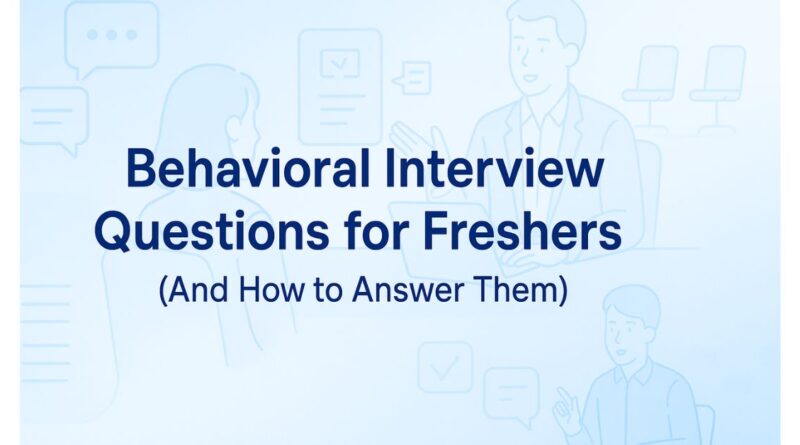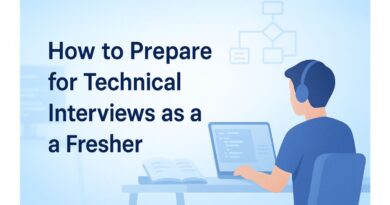Behavioral Interview Questions for Freshers (And How to Answer Them)
Behavioral Interview Questions for Freshers (And How to Answer Them)
Breaking into the tech world or landing your first corporate job as a fresher is exciting, but one challenge often causes stress: behavioral interviews. These aren’t about your technical prowess—they’re about who you are under pressure, in teams, or in unfamiliar situations. The good news? With preparation and a strategy like the STAR method, you can confidently tackle even the trickiest behavioral interview questions for freshers.
Let’s dive into this comprehensive guide packed with real examples, behavioral interview answers for freshers, and proven techniques.
Why Do Behavioral Interviews Matter for Freshers?
Behavioral interviews help employers predict how you’d act in future job-related situations by analyzing your past behavior—even from college projects or internships.
Key reasons companies ask behavioral questions:
-
To understand your communication style
-
To assess how you solve problems
-
To check cultural fit and team dynamics
-
To evaluate emotional intelligence
Freshers may lack work experience, but you can still showcase value by drawing from academic, volunteer, or internship experiences.
Understanding the STAR Method for Interview Answers
One of the best frameworks to structure your behavioral responses is the STAR method:
What does STAR stand for?
-
Situation: Describe the context briefly
-
Task: Explain your role or goal
-
Action: Highlight specific steps you took
-
Result: Share the outcome with impact
This keeps your answer concise, clear, and memorable—ideal for fresher behavioral interview questions with answers.
Top 10 Behavioral Interview Questions for Freshers (With Answers)
Let’s explore the most common behavioral questions for freshers with STAR-based sample responses.
1. Tell me about a time you faced a challenge during a project.
Sample Answer:
Situation: In my final-year project, our team faced a data loss due to system failure.
Task: As the team lead, I had to find a way to recover or recreate the data.
Action: I organized quick meetings, divided tasks, and reached out to our professor for backup help.
Result: We successfully rebuilt the dataset within two days and completed the project on time.
2. Describe a situation where you worked in a team.
Sample Answer:
Situation: During a hackathon, we had to build an app in 36 hours.
Task: My role was frontend development and team coordination.
Action: I set up short syncs, distributed tasks based on skills, and helped debug backend code too.
Result: We won second place and improved our teamwork significantly.
3. Have you ever had a conflict with a teammate or classmate? How did you resolve it?
Sample Answer:
Situation: A teammate in our group assignment wasn’t contributing much.
Task: I wanted to resolve it without hurting team spirit.
Action: I spoke privately, learned he was struggling with another subject, and adjusted task load.
Result: He started participating actively and appreciated the support.
4. Share an instance where you showed leadership.
Sample Answer:
Situation: As the cultural fest coordinator, I had to manage 20+ volunteers.
Task: Ensure smooth operations during multiple events.
Action: I delegated roles, created WhatsApp groups for real-time updates, and handled last-minute vendor issues.
Result: The event was a huge success and appreciated by faculty.
5. Tell me about a time you failed. What did you learn?
Sample Answer:
Situation: I failed my first coding contest in college.
Task: I wanted to improve my problem-solving skills.
Action: I joined LeetCode, practiced daily, and asked seniors for feedback.
Result: Within 6 months, I placed in the top 10 of a national-level coding contest.
6. How do you handle pressure or tight deadlines?
Sample Answer:
Situation: My final exams overlapped with my internship assignment deadline.
Task: I had to balance both efficiently.
Action: I used a priority matrix, blocked time slots, and avoided multitasking.
Result: I scored well and submitted my internship project early.
7. Describe a time when you had to learn something quickly.
Sample Answer:
Situation: I was assigned a new tech stack (React.js) during an internship.
Task: Deliver a UI module in just one week.
Action: I took a crash course, watched YouTube tutorials, and referred to docs.
Result: Delivered on time and got appreciation for the UI quality.
8. Share an example of going above and beyond.
Sample Answer:
Situation: I was just a participant in a college club initially.
Task: Improve engagement during the annual tech fest.
Action: I proposed a new event, pitched it to faculty, and managed marketing.
Result: The event saw 3x participation and is now a recurring part of the fest.
9. Talk about a time you received constructive criticism.
Sample Answer:
Situation: During my internship, my mentor noted I had unclear commit messages.
Task: Improve my version control practices.
Action: I started using conventional commit messages and reading Git guides.
Result: My mentor appreciated the changes in the next review.
10. Have you ever helped someone without being asked?
Sample Answer:
Situation: A junior was struggling with DBMS concepts before exams.
Task: Help him understand it clearly.
Action: I created short notes, used analogies, and gave him practice questions.
Result: He passed with a good grade and later became a peer tutor.
How to Answer Behavioral Interview Questions Effectively
You now know the kinds of questions to expect. But how to answer behavioral interview questions effectively?
Key tips to master your responses:
-
Use the STAR method consistently
-
Practice aloud with mock interviews
-
Keep it real – don’t memorize, just structure
-
Focus on impact – highlight how your action made a difference
-
Adapt stories for different questions (teamwork, leadership, challenges)
Situational Interview Questions for Freshers: What’s Different?
While similar to behavioral questions, situational interview questions for freshers are hypothetical—what you would do, not what you did.
Example Situational Questions:
-
What would you do if a teammate didn’t agree with your idea?
-
How would you prioritize tasks in a new job role with limited time?
-
If your manager gave unclear instructions, how would you handle it?
How to Answer:
Use the SOAR variation: Situation, Objective, Action, Result. Show logical thinking and decision-making even if you haven’t faced it yet.
Common Mistakes to Avoid in Behavioral Interviews
Even with preparation, candidates often fall into traps. Watch out for these:
Avoid These:
-
Giving vague, unstructured answers
-
Speaking negatively about team members or professors
-
Forgetting the “Result” part of the STAR method
-
Going off-topic or being too detailed
-
Faking experiences (HRs can tell!)
Practice Questions: A Mini Bank for Freshers
Below is a list of sample behavioral interview questions for freshers for self-practice:
-
Describe a time when you had to multitask under pressure.
-
Share a project experience that didn’t go as planned.
-
Tell me about a goal you set and how you achieved it.
-
Have you ever made a mistake? How did you handle it?
-
What motivates you to perform at your best?
Practice with a timer and record your answers to improve delivery.
How to Prepare for Behavioral Interviews as a Fresher
Preparation goes beyond memorizing responses. Here’s what to include in your prep plan:
Your Prep Checklist:
-
Identify 6–8 stories from college, internships, or volunteer work
-
Map each story to skills: teamwork, leadership, pressure, etc.
-
Practice with a mentor, senior, or career coach
-
Review job description to align answers with company values
-
Prepare questions to ask the interviewer
Final Thoughts: Turning Your Story into Your Strength
Behavioral interviews don’t test how much you’ve done but how you think, react, and grow. Use the STAR method, remain honest, and adapt your academic or life experiences creatively.
Follow us for more Updates: Telugu Careers Hub




